There's some good in this world, Mister Frodo
The daring optimism of J.R.R. Tolkien
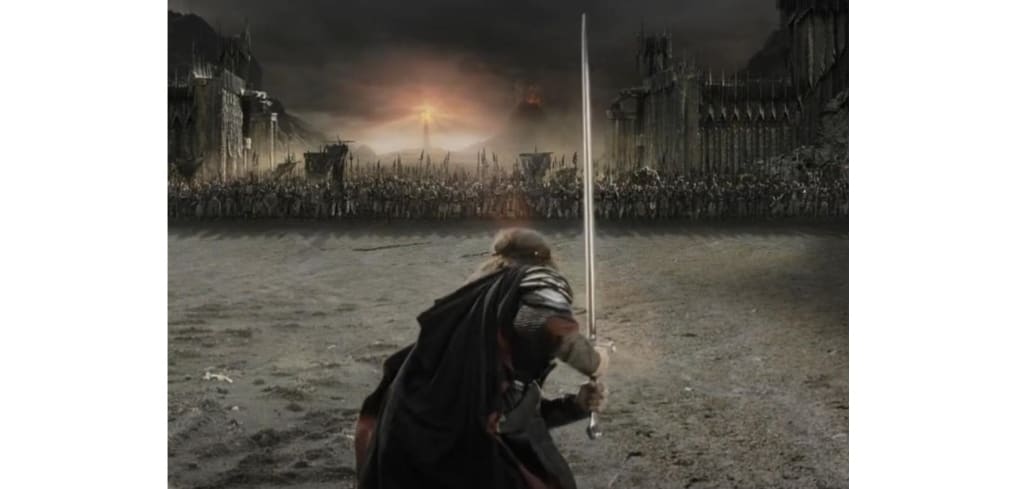
SPOILER ALERT: The following piece contains major spoilers for the series A Song of Ice and Fire (Game of Thrones) and The Lord of the Rings and minor spoilers for the series The Handmaid’s Tale.
.
.
.
.
I will never forget the utter shock I felt when Ned Stark was beheaded.
I remember rereading the page twice, just to make sure I correctly understood. It was a surreal experience. Virtually the entire book had built Stark as the hero of the story, a flawed, honorable man who favored diplomacy and tried to use words instead of swords whenever possible. Sadly, his own sense of decency was used against him in a ruthless betrayal, and he was given a choice: renounce his own honor or be publicly executed. Multiple characters convinced him to stay alive, to lie and confess to a crime he did not commit, and when he finally decided to do this, he was betrayed yet again and killed in front of a crowd of onlookers.
It was an incredible moment. Almost every story I had read had trained me to believe that Ned would get out of it. He was The Good Guy. There was no way he would be killed after all the time he spent trying to do The Right Thing. It went against every story structure I had read until that point.
And yet, in a brutal moment that would define the rest of the series, he was dead.
The remainder of the A Song of Ice and Fire books and the Game of Thrones series were full of things like this, awful moments where people trying to do The Right Thing were punished for it. Tyrion’s sham trial, the Red Wedding, and the Night Watch’s murder of Jon Snow are a few of the many examples. While some have claimed this is an accurate reflection of the darkest parts of human nature, to me it began to seem…well, old. Tiresome. At a certain point, it crossed a threshold from a realistic portrayal of human evil to violence for the sake of violence. This can even be seen in the statements of its creator; after watching the heart-wrenching Breaking Bad episode “Ozymandias,” George R. R. Martin reacted by writing the following on his LiveJournal:
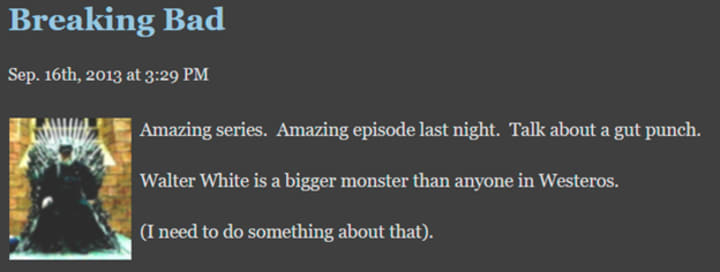
While part of his statement could be viewed as a joke or sarcasm, it seems like the motivation for his human monsters is much more about shock value than realism. On one hand, I can understand that; books and shows are meant to entertain, and it is important to think about what will captivate the audience. However, there’s a certain point where it becomes over-the-top, and I think Game of Thrones went past that in certain moments. The series has become famous for gratuitous violence, explicit sex, and traumatizing scenes of sexual assault, several of which I found myself skipping past because they were so uncomfortable to watch.
And Game of Thrones is not the only series to fall into this trap. My wife and I are huge fans of The Handmaid’s Tale. Based on the dystopian novel by Margaret Atwood, the series explores a world in which a puritanical group takes control of the United States and dictates that the only responsibility of women is to serve men, primarily by bearing children. It is an extremely harrowing and believable show, but there is a moment where it crosses the same line. One episode shows Washington DC under the new government and reveals that all fertile women living there have a metal ring installed in their lips to keep them from speaking. It is shocking, horrible, and realistic in the moment, but the more I thought about it, the more it fell apart. The entire premise of the show is that women are forced to stay healthy for their pregnancies, but that ring defeats the purpose. How do they eat? How do they take care of their teeth? If their nose gets congested, do they just suffocate and die? It doesn’t make sense, and again, it feels like the writers wanted to get a reaction out of the audience rather than add anything substantial to the story.
It is moments like these, when instantaneous responses are prioritized over emotional depth, that I find myself compelled by the brave optimism of The Lord of the Rings.
One of the most defining works of the twentieth century, J.R.R. Tolkien’s epic trilogy redefined the fantasy genre for generations. It has been cited as a major influence by Stephen King, George R.R. Martin, J.K. Rowling, Terry Brooks, Neil Gaiman, and Christopher Paolini. The series has been adapted many times over the past seventy years, the most famous of which is likely Peter Jackson’s film trilogy in the early 2000s. The movies brought Tolkien’s vision to life and proved that big-budget fantasy films could be shown on the silver screen to the love of audiences everywhere.
But despite its enormous influence, what truly inspires me about Tolkien’s series is that, regardless of the terrible events unfolding around the characters, the voice of the narrative is unabashedly hopeful.
The Lord of the Rings details the story of Frodo Baggins, a hobbit from a content, agrarian society who is in possession of a magic ring. With the help of the wizard Gandalf, he discovers that it is actually an incredibly evil object created by the dark lord Sauron, who has laid siege upon the peoples of the world for centuries. With the help of his companions, Frodo must go on a quest to destroy the Ring before Sauron can reclaim it and bring chaos and destruction to the land.
Needless to say, Tolkien’s series contains some very dark content. Sauron’s forces seek not only to claim dominion of the world, but to destroy other life and carry out a genocide of all opposition. A major theme of the trilogy is power and how deeply it can corrupt even the kindest minds. The One Ring is often the catalyst of this, and throughout the series, many characters are tempted by the power it holds and attempt to take it through violence, sometimes even resorting to murder.
And yet, through all of this, there is an undercurrent of hope.
One of the most famous examples of this occurs near the beginning of the first book in the series, when Frodo is learning about the evil of the Ring and what it represents:
‘I wish it need not have happened in my time,’ said Frodo.
‘So do I,’ said Gandalf, ‘and so do all who live to see such times. But that is not for them to decide. All we have to decide is what to do with the time that is given to us.’
—J.R.R. Tolkien, The Lord of the Rings: The Fellowship of the Ring (p. 55)
This moment is so powerful that it was depicted almost word for word in Jackson’s adaptation at a different point in the story, and no matter how many times I’ve watched it, that scene never fails to bring a tear to my eye. In both versions, although the threat exists, the companions are not in immediate danger. They are not in the midst of battle, and Gandalf is not trying to get Frodo to stand up and keep fighting. Nor is he attempting to keep Frodo calm so they can continue with the quest. This is a moment of inspirational talk from one friend to another. Gandalf cares about Frodo. He is not trying to accomplish a task or manipulate Frodo in some way; he is acknowledging Frodo’s feelings and doing his best to encourage him. It is hopeful. It is optimistic. But most of all, it is realistic.
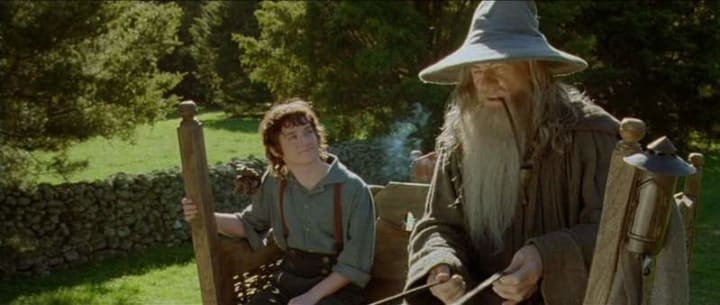
Think about the deep conversations you have with your loved ones. You know the interactions I’m talking about: discussions of existential crises, reflections on strife you’ve endured, stories of old days, and others. They might only pertain to you, but they are meaningful. Perhaps, like Frodo, you’ve spoken of the hopelessness you feel and the regrets you have. Or maybe it was something significantly less important; maybe you were having a hard week at work or were hurt by an offhanded comment.
Regardless of what the hardship is, if your loved ones are like mine, they talk to you about it. They take the time to acknowledge your feelings and help you stand up to face them.
And yet, these types of conversations are unusually infrequent in “serious” media. Unless the plot is directly oriented around friendship – such as The Shawshank Redemption or The Intouchables – the interactions between characters rarely address positive emotions such as hope or excitement. More often, they seem to be talking in gritty terms about their dire state. Conversely, The Lord of the Rings stands out in the fantasy genre by choosing to focus on the light rather than the dark.
Tolkien did this even in somber moments, such as the death of a main character. Frodo is accompanied on his quest by several others, two of which are named Aragorn and Boromir. At a first glance, the two are similar; both are impressive fighters and come from the same kingdom in decline. However, when tempted by the power of the Ring, Aragorn resists while Boromir falls for its temptation. He sees the Ring as a weapon that can be used to save his people and tries to take it from Frodo by force. However, as soon as he fails, he realizes his mistake and attempts to protect his companions in battle. Although he kills many enemy soldiers, he is struck down and two of his friends are taken. Aragorn finds him after the battle, leading to this scene from the beginning of the second novel:
. . . in a little glade not far from the lake [Aragorn] found Boromir. He was sitting with his back to a great tree, as if he was resting. But Aragorn saw that he was pierced with many black-feathered arrows. . . . Many Orcs lay slain, piled all about him and at his feet.
Aragorn knelt beside him. Boromir opened his eyes and strove to speak. . . . ‘I tried to take the Ring from Frodo,’ he said. ‘I am sorry. I have paid.’ His glance strayed to his fallen enemies; twenty at least lay there. ‘. . . the Halflings: the Orcs have taken them. . . .’ He paused and his eyes closed wearily. After a moment he spoke again.
‘Farewell, Aragorn! Go to [our city] and save my people! I have failed.’
‘No!’ said Aragorn, taking his hand and kissing his brow. ‘You have conquered. Few have gained such a victory. Be at peace! [Our city] shall not fall!’
Boromir smiled.
‘Which way did they go? Was Frodo there?” said Aragorn.
But Boromir did not speak again.
—J.R.R. Tolkien, The Lord of the Rings: The Two Towers (p. 4)
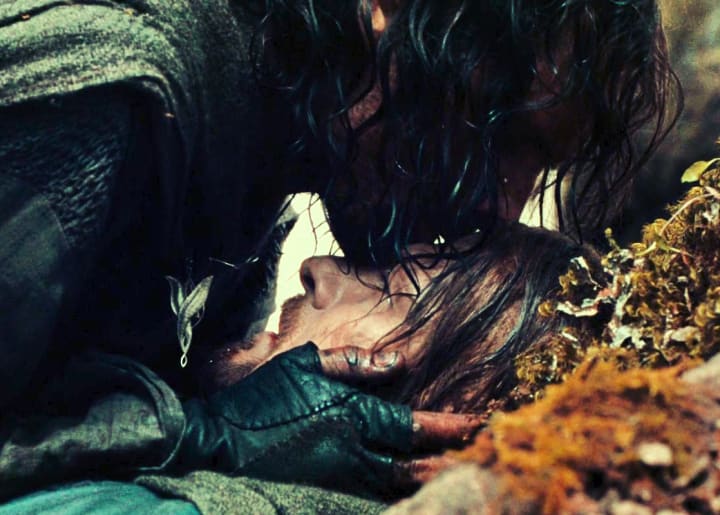
At this moment, Aragorn could have said anything without dramatically altering the story. He could chastised Boromir on his mistakes that led to this violence, or even remained silent and allowed Boromir to pass quietly. Instead, he chose words of encouragement and allowed Boromir to die not with regret from his failures, but with hope for the future of his kingdom.
This was a deliberate choice by Tolkien: to have Aragorn focus on the bright future rather than the dim past. It is a choice Tolkien made over and over again, and no character demonstrates this more clearly than Frodo’s closest friend, Samwise Gamgee.
Another hobbit in the series, Sam was Frodo’s gardener before Gandalf tasked him to join Frodo on his long journey. He was not a warrior or fighter of any kind. He was an ordinary country worker who did not imagine he would ever leave his homeland, though he wondered what else was out there during his childhood. Even the name “Samwise” was derived from an ancient English word meaning “half-wise” or “simple.” And yet, despite his lack of qualifications, he serves as an unstoppable beacon of hope for Frodo from the beginning to the end.
Beneath the dark shadow of their quest, Sam always focuses on the light. He talks of Rosie, the girl he loves back home and how much he wants to see her again. He carries his favorite cookware with him and frequently tries to make good meals out of what they can forage. He cannot hide his excitement for exploring new lands and meeting new people, particularly the Elves. And he never, ever gives up on Frodo. As the pair approaches their destination across the poisonous land of Mordor, Frodo is rapidly giving in to dehydration, fatigue, and the immense power of the Ring. Tolkien wrote this passage at the moment Sam starts to lose hope:
Sam tried to guess the distances and to decide what way they ought to take. ‘It looks every step of fifty miles,’ he muttered gloomily, . . . ‘and that’ll take a week, if it takes a day, with Mr. Frodo as he is.’ He shook his head, and as he worked things out, slowly a new dark thought grew in his mind. Never for long had hope died in his staunch heart, and always until now he had taken some thought for their return. But the bitter truth came home to him at last: at best their provision would take them to their goal; and when the task was done, there they would come to an end, alone, houseless, and foodless in the midst of a terrible desert. There could be no return.
. . . .
But even as hope died in Sam, or seemed to die, it was turned into a new strength. Sam’s plain hobbit-face grew stern, almost grim, as the will hardened in him, and he felt through all his limbs a thrill, as if he was turning into some creature of stone and steel that neither despair nor weariness nor endless barren miles could subdue.
—J.R.R. Tolkien, The Lord of the Rings: The Return of the King (p. 225)
Here Sam is not only brave and determined, but he proves that he is incapable of losing hope. For perhaps the first time in the series, he begins to feel dread, accepting that he and Frodo will likely die after the completion of their quest. And yet, faced with knowledge that could make the strongest among us crumble, his body does not let him stop. He takes a moment, steels himself, and goes on, carrying his friend along the way. It is because of moments like this that Sam is often regarded as the “true hero” of The Lord of the Rings. This mentality is even shared by the author, who wrote the following in a 1951 letter:
I think the simple ‘rustic’ love of Sam and his Rosie (nowhere elaborated) is absolutely essential to the study of his (the chief hero’s) character, and to the theme of the relation of ordinary life (breathing, eating, working, begetting) and quests, sacrifice, causes, and the ‘longing for Elves,’ and sheer beauty.
—J .R.R. Tolkien, Letter 131 to Milton Waldman
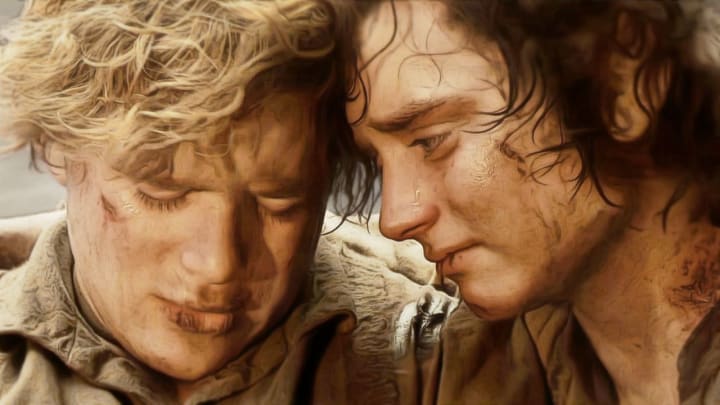
The Lord of the Rings is filled with heroic characters. There are great leaders, like Gandalf and Aragorn, and excellent fighters, like Boromir. There are even those with truly impressive wills, like Frodo demonstrates in his ability to resist the power of the Ring. But Tolkien believed that the most important character, the “chief hero,” was the one who never stopped longing for ordinary life and never lost hope that he would see it again. To Tolkien, those were the things that mattered.
J.R.R. Tolkien was no stranger to darkness. His trilogy is filled with death and destruction, everything from soldiers falling in battle to the attempted obliteration of entire cities. Until his death, he claimed that The Lord of the Rings was not meant to be representative of any real-world events, despite any parallels readers may have perceived. However, I don’t think it is a coincidence that it was written in England from 1938 to 1947, when millions of people were being killed a few hundred miles away. But despite the true evil experienced at that time, he was able to craft a work of art that would go on to bring joy to people all over the world.
That joy is his legacy. And it is the reason The Lord of the Rings is the greatest fantasy of our time.
Over the course of this piece, I have used several quotations that I feel demonstrate Tolkien’s view on optimism. I’d like to close with one more. This is a line from one of the movies, when Frodo, in a moment of weakness, begins to doubt their quest. Its entirety does not appear word-for-word in any of Tolkien’s writings, but parts of it are taken from several passages in the original books, and I believe it is the best single example of the message of this series:
FRODO: I can’t do this, Sam.
SAM: I know. It’s all wrong! By rights we shouldn’t even be here. But we are.
It’s like in the great stories, Mister Frodo. The ones that really matter. Full of darkness and danger they were. And sometimes you didn’t want to know the end. Because how could the end be happy? How could the world go back to the way it was when so much bad had happened?
But in the end, it’s only a passing thing, this shadow. Even darkness must pass. A new day will come. And when the sun shines, it’ll shine out the clearer. Those were the stories that stayed with you, that meant something, even if you were too small to understand why.
But I think, Mister Frodo, I do understand! I know now! Folks in those stories had lots of chances of turning back, only they didn’t. Because they were holding on to something.
FRODO: What are we holding on to, Sam?
SAM: That there’s some good in this world, Mister Frodo. And it’s worth fighting for.
—The Lord of The Rings: The Two Towers (2002)
About the Creator
Matt Spaziani
Robotics engineer by day and writer, musician, and gamer by night.






Comments
There are no comments for this story
Be the first to respond and start the conversation.